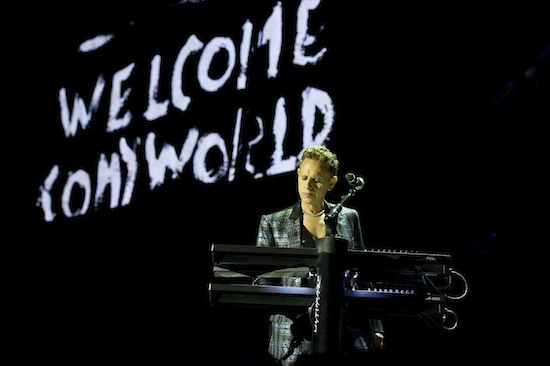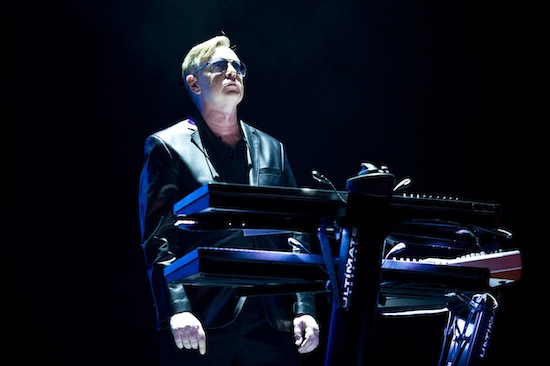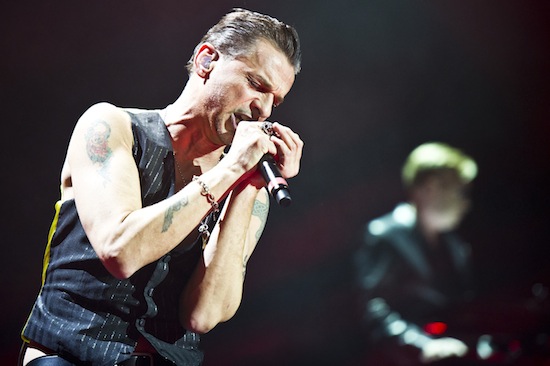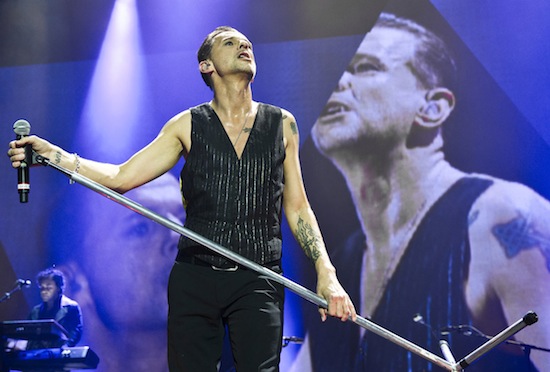One of the many contributions to British cultural life made by popular television programme The Only Way Is Essex is a haircut called a ‘fusey’. Modelled by TOWIE star Joey Essex, the cut involves a sharp shave from the hairline to about an inch above the ears, with the locks left long on top. Yet is the fusey as pioneering as the tabloid press has made out? When I first saw a picture of of the young Mr Essex, the first thing that occurred to me was how similar it was to the hairstyles of Depeche Mode when they emerged, fresh of face and sprightly of synth, from Basildon in 1980.
Tonight at the 02 Arena, there’s a lot of Essex here, perhaps leaving their fusey-sporting offspring at home for the trip down on the Central Line, heading into the venue after a midweek meal out in one of the O2’s many chain restaurants. Anyone under 30 (a few with fuseys) is queuing up at the box office to collect tickets for tattooed, 22-year-old rapper Tyga, playing the smaller Indigo venue next door. Oddly enough there don’t seem to be many of the Euro goths you’d expect to see at a Depeche Mode concert. Perhaps they were there from the beginning of the evening, down the front – that’s where the Polish flags are being held up as we take to our seats to the sound of some decent, clunking techno from the warm-up DJ.
It bodes well for what’s to come. I saw Depeche Mode here once before, after a 15 year-wait, and it was a diabolical evening, Martin Gore wearing a pair of wings that were borrowed from a fairy chicken and weak sound hardly helped by material taken from a run of fairly indifferent albums.
The lights go down, and ‘Welcome To My World’ is ushered in with a mighty toot, as if from a tugboat sailing past up the the Thames, and pleasingly grubby electronics fill this cavern of a venue. But what is Depeche Mode’s world now? Thirty years on from their formation they’re undoubtedly a heritage group, though perhaps in a different way to their peers or predecessors. Unlike other synth groups, they’re not hidebound by the problem of still sounding fresh and futurist many years on, for Depeche Mode never were that. They were synth-pop twee and then pompous deviants, but their innovation was tying the unusual sonics of their Mute labelmates to a leathery rock & roll aesthetic, as if they’d smashed Led Zeppelin’s guitars before escorting them to Rumbelows and a junkyard. As time has gone on, this has widened to include rock & roll’s bluesier origins, largely via Gahan’s vocal, as is explored on latest album Delta Machine.

"Eeef you stay a waaaaaal"… Gahan’s bellow powers out through the O2. On Delta Machine his voice is at times rather ludicrous, but tonight a monumentally solid sound design (they’ve spent a lot more on that than the visuals) means that it rumbles back rather satisfyingly over the well-bedded live drums, Gore’s synths, and Fletch’s… Fletch jumps around, looking like the love child of Elton John and Michael Gove auditioning for Kraftwerk.

There are screams when Gahan takes off his jacket in ‘Walking In My Shoes’, and on the screens behind the band he looks barely older than when that track was released two decades ago, despite all the near and actual death he’s endured since. It’s when they play ‘Black Celebration’ that the place really erupts. And why not? It’s five minutes of throbbing stadium-goth brilliance that sets the tone for the rest of the set, which takes the growling darkness of Delta Machine as its starting point to head back through plenty of gloaming from Violator and Black Celebration. But how does the new material fare compared to the oldies?
I must admit that Delta Machine hasn’t stayed with me quite as much as I thought it would, perhaps because Gahan’s vocals and all the lyrics of redemption, loss, forgiveness etc might even get a bit much for the congregation of a Welsh pit chapel circa 1870. Yet tonight, when you’re immersed in the Depeche Mode universe, it feels like part of a three-decade-long whole, a career marked by its thrall to sex, death, loss, decadence and unholy confusion, but also its romance and humour. Clues come in the visuals, a perfect blend of daft and art. In ‘Precious’ the band are backed by 100 foot-high footage of dogs – a red setter, collie, rottweiler – as if they’d been commissioned to shoot a promo for Battersea Dogs Home. It certainly looks pretty incongruous as Gahan shakes his arse at the crowd, facing footage of some pooch’s saggy brown jowls. Yet then there’s a new video for ‘Heaven’, a piece of Anton Corbijn brilliance that sees the band wandering around in plague doctor masks, top hats and goggles, carrying and putting down triangles. It’s far superior to the original official video released with the song, which was seemingly designed to appeal to Aerosmith fans in Kentucky.

Depeche Mode’s wholehearted embracing of the ludicrous continues via a vastly inappropriate drum solo in ‘Enjoy The Silence’ (an ostentatious faux-iron automatic gate in front of a proportioned Georgian home) and Gore’s star-shaped guitar. Then there’s the the contrast between the oomph of the bracingly seedy ‘Question Of Time’ and when Gore does a semi-acoustic solo rendition of ‘When The Body Speaks’ that really belongs on the kind of cruise ship holiday you suspect much of this crowd has taken. He holds a note magnificently and long for a similar over-40s-X Factor-audition take on ‘Home’, the audience still ‘woah-oah-ing’ long after he’s done. Gahan says – in broad Essex – "imagine it’s your football team. It’s a beautiful thing… Martin Gore!" Does one detect a hint of jealousy?
Yet from ‘Just Can’t Get Enough’ to ‘Personal Jesus’ and the sight of thousands of people swinging their arms in time to ‘Never Let Me Down Again’, the peaks of tonight’s show are solid proof that Depeche Mode are responsible for same of the best moments in British pop over the past three decades. The rest – and this includes the new material – is accompanying evidence that they’ve also been getting on with their own odd, occasionally foolish, sometimes misguided, unselfconscious thing whether the rest of the world cares or not.
For it’s important to embrace the sublime and the ridiculous of what Depeche Mode do. Much of what I loved about Martin Gore and Vince Clarke’s VCMG collaboration was the sheer cheek of the record – this was techno made by people who had last collaborated as the young tykes writing Speak & Spell. And while some of the VCMG sonics have undoubtedly influenced Depeche Mode in 2013, it’s a similar sense of the slightly silly that gives tonight such charm.
When later this summer Depeche Mode hit Rome, Vilnius and Minsk, all Gahan’s exertions, crucifix poses and mic stand stomps – (his stand is clearly forged in a smithy accustomed to Saxon broadswords) will be better appreciated than they are here. But that’s just part of Depeche Mode’s enduring incongruity, that means they can sing a stadium chant like "I surrender heart and soul / sacrificed to a higher goal" that’s more Billy Graham than Muse and get away with it. As inventive and eccentric as the huts at Jaywick, as proud and brash as TOWIE, there’s never any doubting that Depeche Mode, for all their record sales and jetsetting, are rooted just a short commute from here in North Greenwich. Thirty years ago in Basildon, Depeche Mode (the boy with a mixed race heritage, the churchgoer, the pretty working-class tear-away) were outsiders in a tough town. In London, May 2013, very little has changed.


